Academia
The environment or community concerned with the pursuit of research, education, and scholarship.
Lex Icons is an extensive, open-source collection of icons that help explain key terms and principles that define global food systems. You can view a selection of our icons here and on The Noun Project, the world’s largest repository for open-source icons.
All Lex Icons designers own their work but have granted the royalty-free, perpetual, non-exclusive, worldwide right of usage of their work to thelexicon.org under a Creative Commons 4.0 license. Licensees (you) are allowed to share (copy and redistribute Lex Icons in any medium or format) or adapt (remix, transform, and build upon the material for any purpose, even commercially). The licensor (us) cannot revoke these freedoms as long as the licensee follows these license terms.
Attribution: You must give appropriate credit, provide a link to this web page, and indicate if any changes have been made to these Lex Icons. You may do so in any reasonable manner, but not in any way that suggests the licensor endorses you or your use.
Note: You may not apply legal terms or technological measures that legally restrict others from doing anything this license permits.
Finally, these Lex Icons are cool, but the designers of each icon reserve the merchandising rights for their work. This means that merchandise that use these Lex Icons as designs (as opposed to describing some other product), must be negotiated with the icons’ designers. For example, t-shirts, hats, clothing, and other merchandise that only feature a Lex Icon, itself, cannot be sold without permission from the designers.
That’s it! If you have any additional questions, feel free to reach out the Lex Icons team here.
Our panel of international experts explores how our global food systems have become overreliant on only three crops, and what we can do about it.
All Lex Icons designers own their work but have granted the royalty-free, perpetual, non-exclusive, worldwide right of usage of their work to thelexicon.org under a Creative Commons 4.0 license. Licensees (you) are allowed to share (copy and redistribute Lex Icons in any medium or format) or adapt (remix, transform, and build upon the material for any purpose, even commercially). The licensor (us) cannot revoke these freedoms as long as the licensee follows these license terms.
Attribution: You must give appropriate credit, provide a link to this web page, and indicate if any changes have been made to these Lex Icons. You may do so in any reasonable manner, but not in any way that suggests the licensor endorses you or your use.
Note: You may not apply legal terms or technological measures that legally restrict others from doing anything this license permits.
Finally, these Lex Icons are cool, but the designers of each icon reserve the merchandising rights for their work. This means that merchandise that use these Lex Icons as designs (as opposed to describing some other product), must be negotiated with the icons’ designers. For example, t-shirts, hats, clothing, and other merchandise that only feature a Lex Icon, itself, cannot be sold without permission from the designers.
That’s it! If you have any additional questions, feel free to reach out the Lex Icons team here.
Born from an unprecedented global collaboration between hundreds of designers and agrifood system experts, Lex Icons contains visual representations of foundational terms and concepts in key thematic areas, from nutrition to food security, food waste to regenerative agriculture. This open-source collection is made freely available as a Public Domain resource for use by international NGOs, food companies large and small, as well as government agencies. Learn more here.
Solidarity economy refers to a wide range of economic activities that aim to prioritize social profitability instead of purely financial profits in a local economy. One distinguishing feature is that governance and decision-making are more shared and collaborative..
Cameron Ward
USA
Energy that has been derived from earth's natural resources that are not finite or exhaustible, such as wind and sunlight. It is an alternative to the traditional energy that relies on fossil fuels, and it tends to be much less harmful to the environment. Other types of renewable energy include hydroelectric, geothermal, ocean, Hydrogen, etc.
Miriam Young
USA
Native plants that may serve as sources of nectar or pollen for adult pollinators, or plants that host larva. Some plants and flower shapes attract specific pollinators with deep or complex flowers.
Lex Icons Community
USA
Modern industrial fermentation, combined with biotechnology, to build upon natural biological processes to turn microflora into tiny factories that make specific, useful molecules.
Emily VanderMey
USA
Carbon dioxide emissions are those stemming from the burning of fossil fuels and the manufacture of cement. They include carbon dioxide produced during consumption of solid, liquid, and gas fuels and gas flaring.
Hessa Sulaiman Ali
United Arab Emirates
Cultural identity is the identity of belonging to a group. It is part of a person’s self-conception and self-perception and is related to nationality, ethnicity, religion, social class, generation, locality or any kind of social group that has its own distinct culture.
Lex Icons Community
USA
Diversifying the range of plant and animal species or habitats available at a site. This can be acheived through the adoption of practices such as sustainable agriculture practices which support a diverse environment.
Sarah Stern
USA
Are you a designer interested in contributing? Please contact us.
All Lex Icons designers own their work but have granted the royalty-free, perpetual, non-exclusive, worldwide right of usage of their work to thelexicon.org under a Creative Commons 4.0 license. Licensees (you) are allowed to share (copy and redistribute Lex Icons in any medium or format) or adapt (remix, transform, and build upon the material for any purpose, even commercially). The licensor (us) cannot revoke these freedoms as long as the licensee follows these license terms.
Attribution: You must give appropriate credit, provide a link to this web page, and indicate if any changes have been made to these Lex Icons. You may do so in any reasonable manner, but not in any way that suggests the licensor endorses you or your use.
Note: You may not apply legal terms or technological measures that legally restrict others from doing anything this license permits.
Finally, these Lex Icons are cool, but the designers of each icon reserve the merchandising rights for their work. This means that merchandise that use these Lex Icons as designs (as opposed to describing some other product), must be negotiated with the icons’ designers. For example, t-shirts, hats, clothing, and other merchandise that only feature a Lex Icon, itself, cannot be sold without permission from the designers.
That’s it! If you have any additional questions, feel free to reach out the Lex Icons team here.
Follow our latest activities and learn more about how you can take part in your own community.
Our work depends on contributions by people like you. If you like what you see, you can support us here!
We’d love to hear from you! Contact us with general questions or media requests.
This website was built by The Lexicon™, a 501(c)(3) tax-exempt nonprofit organization headquartered in Petaluma, CA.
Check out our Privacy Policy, Cookie Policy, and Terms of Use.
Please provide information about your term for the Lex Icons Library.
This game was designed to raise awareness about the impacts our food choices have on our own health, but also the environment, climate change and the cultures in which we live.
First, you can choose one of the four global regions and pick a character that you want to play.
Each region has distinct cultural, economic, historical, and agricultural capacities to feed itself, and each character faces different challenges, such as varied access to food, higher or lower family income, and food literacy.
As you take your character through their day, select the choices you think they might make given their situation.
At the end of the day you will get a report on the impact of your food choices on five areas: health, healthcare, climate, environment and culture. Take some time to read through them. Now go back and try again. Can you make improvements in all five areas? Did one area score higher, but another score lower?
FOOD CHOICES FOR A HEALTHY PLANET will help you better understand how all these regions and characters’ particularities can influence our food choices, and how our food choices can impact our personal health, national healthcare, environment, climate, and culture. Let’s Play!
The FOOD CHOICES FOR A HEALTHY PLANET game allows users to experience the dramatic connections between food and climate in a unique and engaging way. The venue and the game set-up provides attendees with a fun experience, with a potential to add a new layer of storytelling about this topic.
Starting the game: the pilot version of the game features four country/regions: Each reflects a different way people (and the national dietary guidelines) look at diets: Nordic Countries (sustainability), Brazil (local and whole foods instead of ultra-processed foods); Canada (plant-forward), and Indonesia (developing countries).
Personalizing the game: players begin by choosing a country and then a character who they help in making food choices over the course of one day. Later versions may allow for creating custom avatars.
Making tough food choices: This interactive game for all ages shows how the food choices we make impact our health and the environment, and even contribute to climate change.
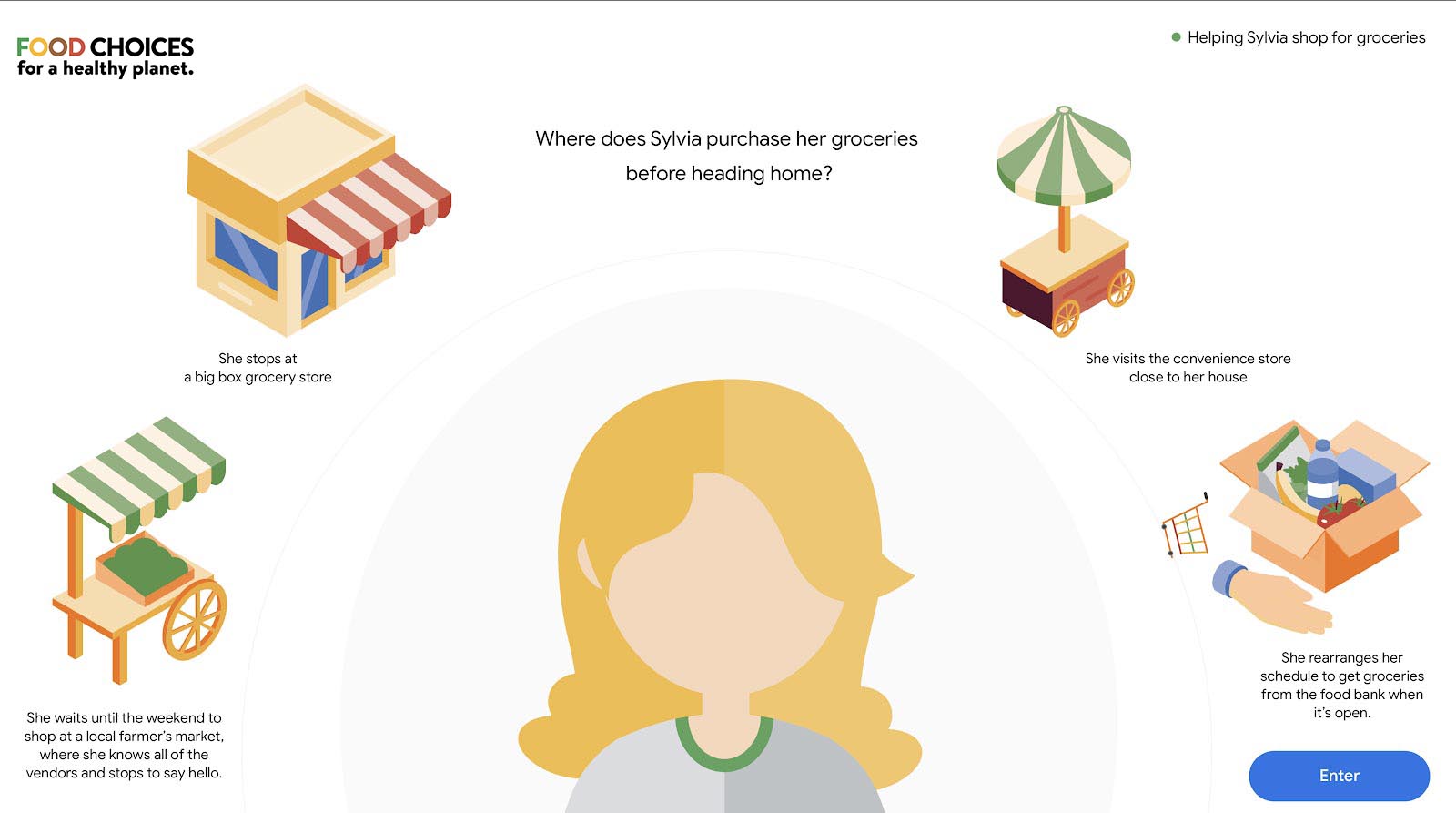
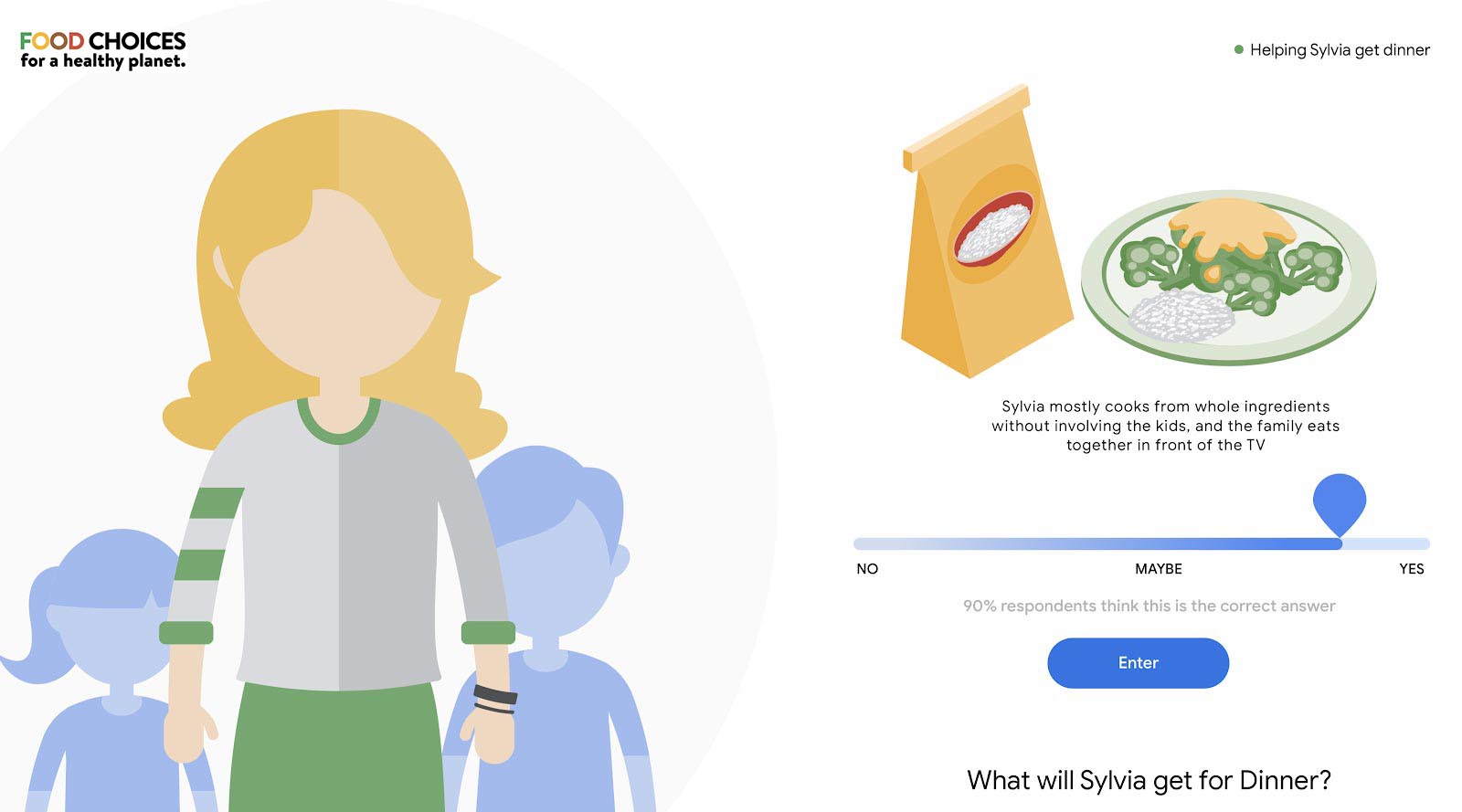
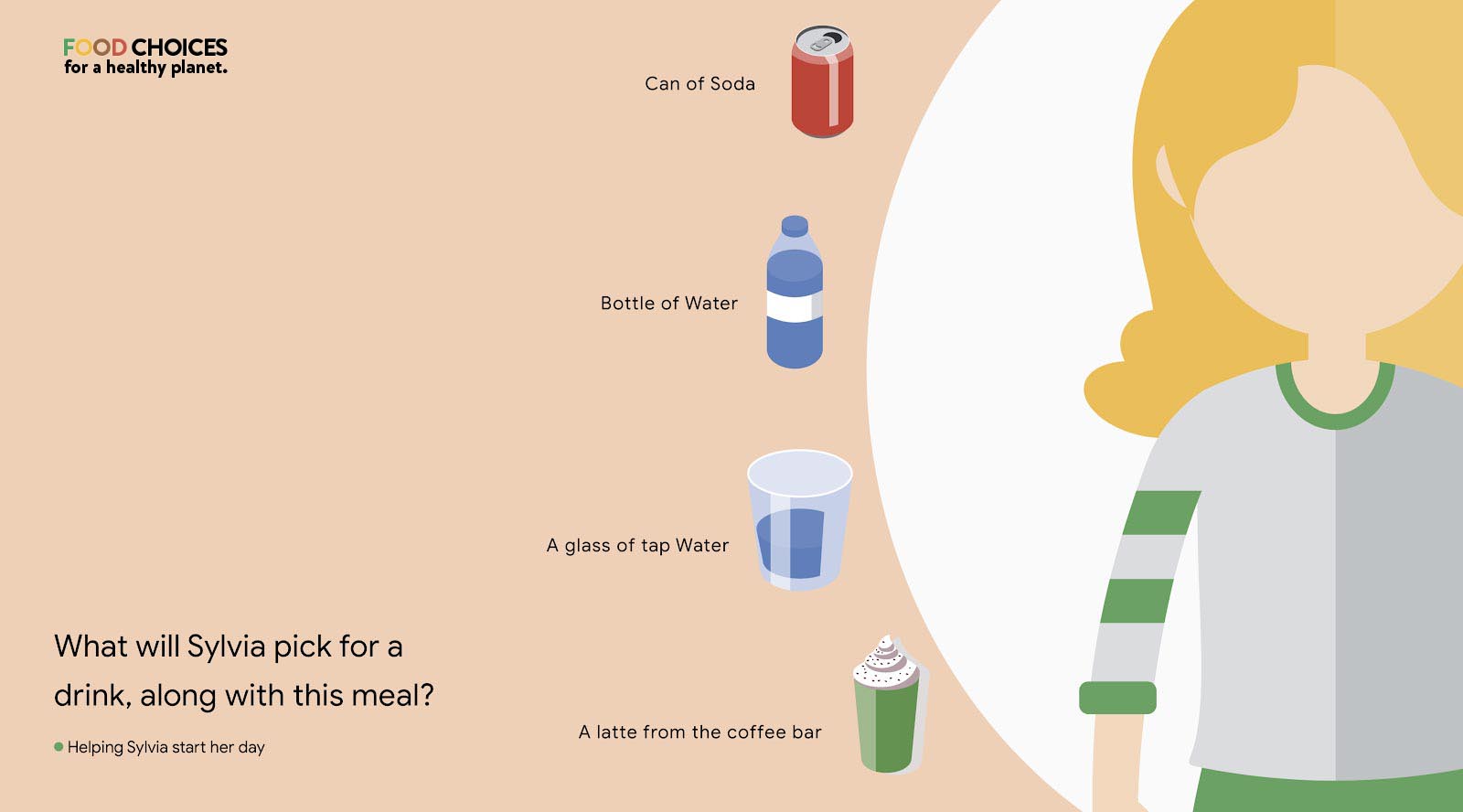
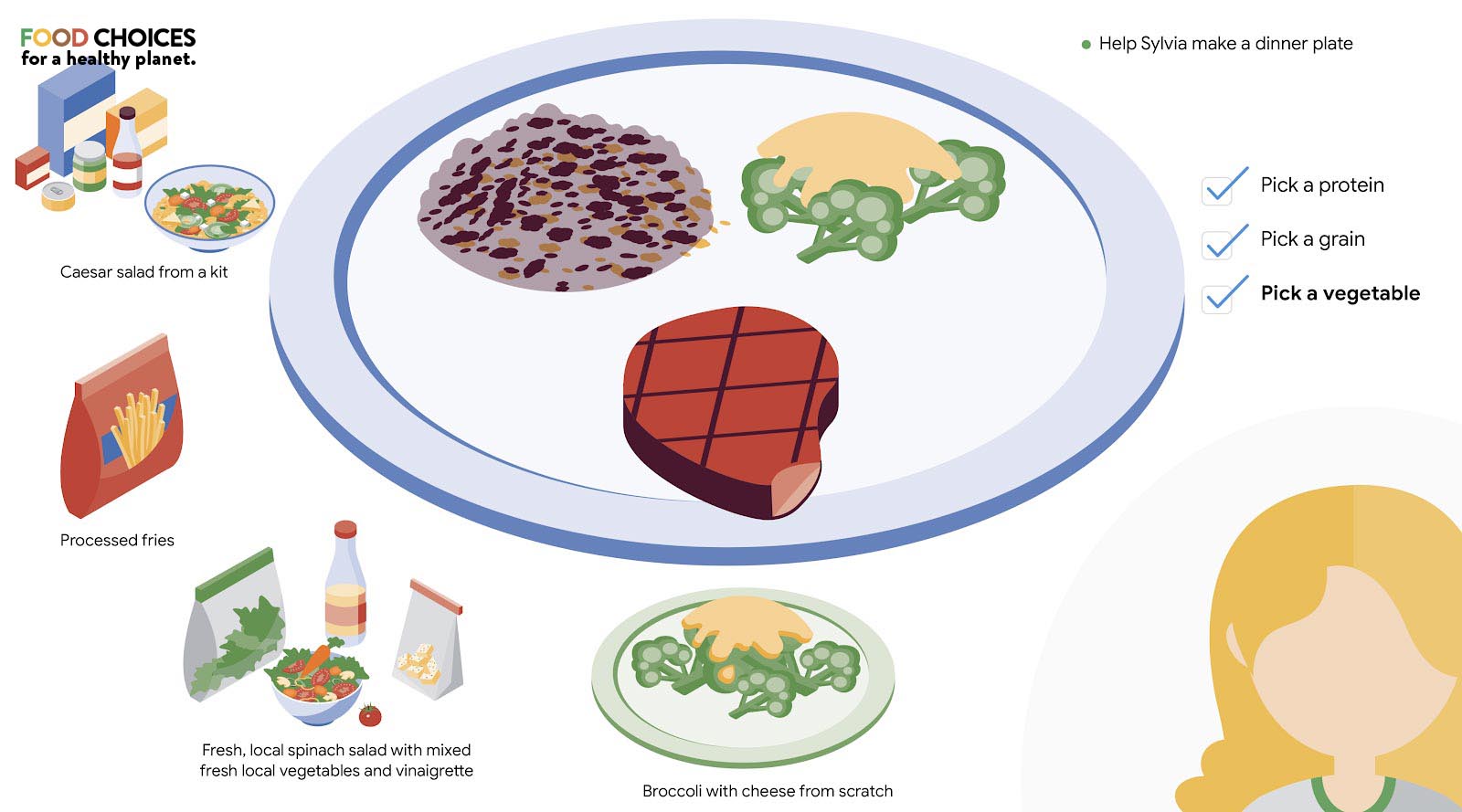
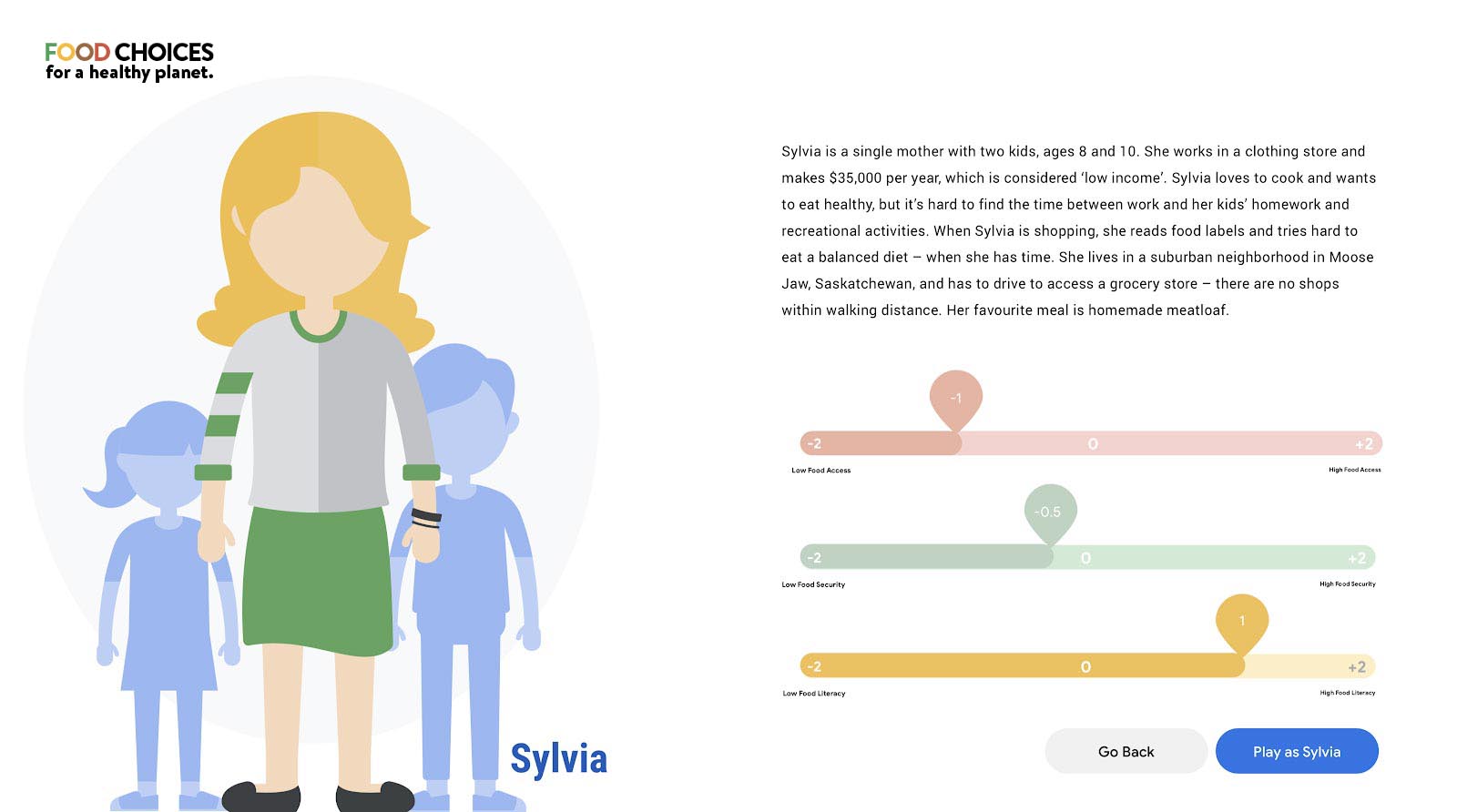
What we eat matters: at the end of each game, players learn that every decision they make impacts not only their health, but a national healthcare system, the environment, climate and even culture.
We’d love to know more about you and why you think you will be a great fit for this position! Shoot us an email introducing you and we’ll get back to you as soon as possible!
Providing best water quality conditions to ensure optimal living condition for growth, breeding and other physiological needs
Water quality is sourced from natural seawater with dependency on the tidal system. Water is treated to adjust pH and alkalinity before stocking.
Producers that own and manages the farm operating under small-scale farming model with limited input, investment which leads to low to medium production yield
All 1,149 of our farmers in both regencies are smallholder farmers who operate with low stocking density, traditional ponds, and no use of any other intensification technology.
Safe working conditions — cleanliness, lighting, equipment, paid overtime, hazard safety, etc. — happen when businesses conduct workplace safety audits and invest in the wellbeing of their employees
Company ensure implementation of safe working conditions by applying representative of workers to health and safety and conduct regular health and safety training. The practices are proven by ASIC standards’ implementation
Implementation of farming operations, management and trading that impact positively to community wellbeing and sustainable better way of living
The company works with local stakeholders and local governments to create support for farmers and the farming community in increasing resilience. Our farming community is empowered by local stakeholders continuously to maintain a long generation of farmers.
Freezing seafood rapidly when it is at peak freshness to ensure a higher quality and longer lasting product
Our harvests are immediately frozen with ice flakes in layers in cool boxes. Boxes are equipped with paper records and coding for traceability. We ensure that our harvests are processed with the utmost care at <-18 degrees Celsius.
Sourcing plant based ingredients, like soy, from producers that do not destroy forests to increase their growing area and produce fish feed ingredients
With adjacent locations to mangroves and coastal areas, our farmers and company are committed to no deforestation at any scale. Mangrove rehabilitation and replantation are conducted every year in collaboration with local authorities. Our farms are not established in protected habitats and have not resulted from deforestation activity since the beginning of our establishment.
Implement only natural feeds grown in water for aquatic animal’s feed without use of commercial feed
Our black tiger shrimps are not fed using commercial feed. The system is zero input and depends fully on natural feed grown in the pond. Our farmers use organic fertilizer and probiotics to enhance the water quality.
Enhance biodiversity through integration of nature conservation and food production without negative impact to surrounding ecosysytem
As our practices are natural, organic, and zero input, farms coexist with surrounding biodiversity which increases the volume of polyculture and mangrove coverage area. Farmers’ groups, along with the company, conduct regular benthic assessments, river cleaning, and mangrove planting.
THE TERM “MOONSHOT” IS OFTEN USED TO DESCRIBE an initiative that goes beyond the confines of the present by transforming our greatest aspirations into reality, but the story of a moonshot isn’t that of a single rocket. In fact, the Apollo program that put Neil Armstrong on the moon was actually preceded by the Gemini program, which in a two-year span rapidly put ten rockets into space. This “accelerated” process — with a new mission nearly every 2-3 months — allowed NASA to rapidly iterate, validate their findings and learn from their mistakes. Telemetry. Propulsion. Re-entry. Each mission helped NASA build and test a new piece of the puzzle.
The program also had its fair share of creative challenges, especially at the outset, as the urgency of the task at hand required that the roadmap for getting to the moon be written in parallel with the rapid pace of Gemini missions. Through it all, the NASA teams never lost sight of their ultimate goal, and the teams finally aligned on their shared responsibilities. Within three years of Gemini’s conclusion, a man did walk on the moon.
FACT is a food systems solutions activator that assesses the current food landscape, engages with key influencers, identifies trends, surveys innovative work and creates greater visibility for ideas and practices with the potential to shift key food and agricultural paradigms.
Each activator focuses on a single moonshot; instead of producing white papers, policy briefs or peer-reviewed articles, these teams design and implement blueprints for action. At the end of each activator, their work is released to the public and open-sourced.
As with any rapid iteration process, many of our activators re-assess their initial plans and pivot to address new challenges along the way. Still, one thing has remained constant: their conviction that by working together and pooling their knowledge and resources, they can create a multiplier effect to more rapidly activate change.
Co-Founder
THE LEXICON
Vice President
Global Workplace Programs
GOOGLE
Who can enter and how selections are made.
A Greener Blue is a global call to action that is open to individuals and teams from all over the world. Below is a non-exhaustive list of subjects the initiative targets.
To apply, prospective participants will need to fill out the form on the website, by filling out each part of it. Applications left incomplete or containing information that is not complete enough will receive a low score and have less chance of being admitted to the storytelling lab.
Nonprofit organizations, communities of fishers and fish farmers and companies that are seeking a closer partnership or special support can also apply by contacting hello@thelexicon.org and interacting with the members of our team.
Special attention will be given to the section of the form regarding the stories that the applicants want to tell and the reasons for participating. All proposals for stories regarding small-scale or artisanal fishers or aquaculturists, communities of artisanal fishers or aquaculturists, and workers in different steps of the seafood value chain will be considered.
Stories should show the important role that these figures play in building a more sustainable seafood system. To help with this narrative, the initiative has identified 10 principles that define a more sustainable seafood system. These can be viewed on the initiative’s website and they state:
Seafood is sustainable when:
Proposed stories should show one or more of these principles in practice.
Applications are open from the 28th of June to the 15th of August 2022. There will be 50 selected applicants who will be granted access to The Lexicon’s Total Storytelling Lab. These 50 applicants will be asked to accept and sign a learning agreement and acceptance of participation document with which they agree to respect The Lexicon’s code of conduct.
The first part of the lab will take place online between August the 22nd and August the 26th and focus on training participants on the foundation of storytelling, supporting them to create a production plan, and aligning all of them around a shared vision.
Based on their motivation, quality of the story, geography, and participation in the online Lab, a selected group of participants will be gifted a GoPro camera offered to the program by GoPro For A Change. Participants who are selected to receive the GoPro camera will need to sign an acceptance and usage agreement.
The second part of the Storytelling Lab will consist of a production period in which each participant will be supported in the production of their own story. This period goes from August 26th to October 13th. Each participant will have the opportunity to access special mentorship from an international network of storytellers and seafood experts who will help them build their story. The Lexicon also provides editors, animators, and graphic designers to support participants with more technical skills.
The final deadline to submit the stories is the 14th of October. Participants will be able to both submit complete edited stories, or footage accompanied by a storyboard to be assembled by The Lexicon’s team.
All applicants who will exhibit conduct and behavior that is contrary to The Lexicon’s code of conduct will be automatically disqualified. This includes applicants proposing stories that openly discriminate against a social or ethnic group, advocate for a political group, incite violence against any group, or incite to commit crimes of any kind.
All submissions must be the entrant’s original work. Submissions must not infringe upon the trademark, copyright, moral rights, intellectual rights, or rights of privacy of any entity or person.
Participants will retain the copyrights to their work while also granting access to The Lexicon and the other partners of the initiative to share their contributions as part of A Greener Blue Global Storytelling Initiative.
If a potential selected applicant cannot be reached by the team of the Initiative within three (3) working days, using the contact information provided at the time of entry, or if the communication is returned as undeliverable, that potential participant shall forfeit.
Selected applicants will be granted access to an advanced Storytelling Lab taught and facilitated by Douglas Gayeton, award-winning storyteller and information architect, co-founder of The Lexicon. In this course, participants will learn new techniques that will improve their storytelling skills and be able to better communicate their work with a global audience. This skill includes (but is not limited to) how to build a production plan for a documentary, how to find and interact with subjects, and how to shoot a short documentary.
Twenty of the participants will receive a GoPro Hero 11 Digital Video and Audio Cameras by September 15, 2022. Additional participants may receive GoPro Digital Video and Audio Cameras to be announced at a later date. The recipients will be selected by advisors to the program and will be based on selection criteria (see below) on proposals by Storytelling Lab participants. The selections will keep in accordance with Lab criteria concerning geography, active participation in the Storytelling Lab and commitment to the creation of a story for the Initiative, a GoPro Camera to use to complete the storytelling lab and document their story. These recipients will be asked to sign an acceptance letter with terms of use and condition to receive the camera.
The Lexicon provides video editors, graphic designers, and animators to support the participants to complete their stories.
The submitted stories will be showcased during international and local events, starting from the closing event of the International Year of Fisheries and Aquaculture 2022 in Rome, in January 2023. The authors of the stories will be credited and may be invited to join.
Storytelling lab participation:
Applicants that will be granted access to the storytelling Lab will be evaluated based on the entries they provided in the online form, and in particular:
Applications will be evaluated by a team of 4 judges from The Lexicon, GSSI and the team of IYAFA (Selection committee).
When selecting applications, the call promoters may request additional documentation or interviews both for the purpose of verifying compliance with eligibility requirements and to facilitate proposal evaluation.
Camera recipients:
Participants to the Storytelling Lab who will be given a GoPro camera will be selected based on:
The evaluation will be carried out by a team of 4 judges from The Lexicon, GSSI and the team of IYAFA (Selection committee).
Incidental expenses and all other costs and expenses which are not specifically listed in these Official Rules but which may be associated with the acceptance, receipt and use of the Storytelling Lab and the camera are solely the responsibility of the respective participants and are not covered by The Lexicon or any of the A Greener Blue partners.
All participants who receive a Camera are required to sign an agreement allowing GoPro for a Cause, The Lexicon and GSSI to utilize the films for A Greener Blue and their promotional purposes. All participants will be required to an agreement to upload their footage into the shared drive of The Lexicon and make the stories, films and images available for The Lexicon and the promoting partners of A Greener Blue.